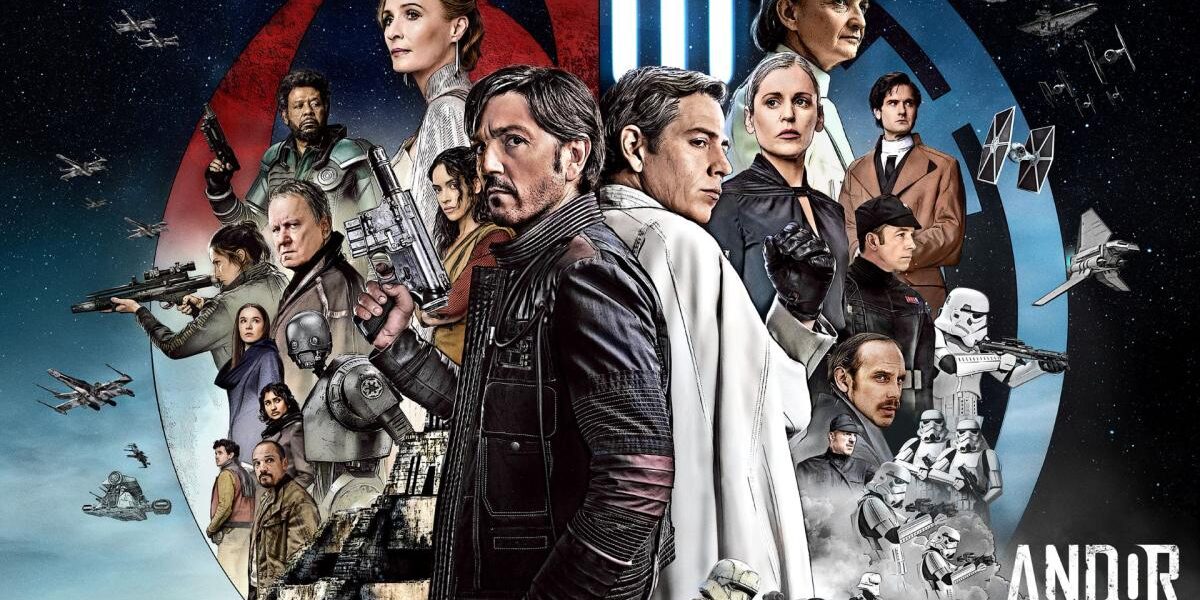Andor Season 2 (Disney+) review: Star Wars at its most grounded and best

Disney+’s Andor returns for its second and final season, continuing to peel back the layers of the Star Wars universe, but more importantly, delving deeper into the gritty reality of rebellion. Season 1 was an unexpected standout, transforming Cassian Andor from a character who many might have overlooked in 2016’s standalone movie Rogue One into someone whose complexities feel essential. With Season 2, the series not only maintains that momentum but enhances it by leaning into the harsh inevitability of its characters’ destinies, delivering an eclectic blend of suspense, drama, and emotional depth.
One of Andor’s most impressive feats, particularly this season, lies in its confident embrace of its prequel status. It’s an easy misstep for any prequel to lose its sense of urgency because the audience is already aware of the endpoint. However, Tony Gilroy and his creative team masterfully navigate this pitfall by using the characters’ known futures as a dramatic catalyst rather than a limitation. Knowing Cassian’s fate – and indeed, the ultimate trajectory of the rebellion – only adds layers of poignancy to each moment, elevating ordinary scenes into something quietly heartbreaking.
That leads to the storytelling here, and the narrative craftsmanship in Season 2 deserves special praise – more so when you consider how far superior it is to any of the post-Disney era Star Wars TV and movies. Structurally, the season continues with its successful anthology-style arcs, breaking its twelve episodes into distinct, cohesive segments. Each three-episode arc spans a year within the Star Wars timeline, each edging a year towards BBY (or Before Battle of Yavin, for non Star Wars fans) which cleverly provides a palpable sense of scope and endurance. The gaps between arcs become narrative tools themselves, implying vast unseen struggles and growth that occur off-screen. It’s an approach that reinforces the exhausting, drawn-out battle the rebellion faces, making victories feel both hard-earned and fleeting.

Diego Luna’s portrayal of Cassian Andor evolves significantly this season. He deftly handles the leaps in Cassian’s character growth, effectively conveying the toll that sustained rebellion takes on a person. Luna brings an authenticity to Cassian’s transformation, showing us not a gradual evolution, but rather stark, abrupt changes brought on by unseen hardships. These changes resonate deeply and reflect the bitter cost of prolonged resistance.
The supporting cast continues to impress too, particularly Genevieve O’Reilly’s Mon Mothma and Stellan Skarsgard’s Luthen Rael. Both characters brilliantly embody the duality required to survive and operate under the oppressive Galactic Empire. Genevieve and Stellan skilfully convey the constant tension between their public facades and their true, rebellious selves. Yet, Season 2 truly shines in its antagonists, specifically Denise Gough’s Dedra Meero and Kyle Soller’s Syril Karn. Their arcs offer insightful perspectives into the Empire’s inner workings, and the actors bring nuanced, layered performances that highlight their characters’ complexities and contradictions.
Andor also distinguishes itself from other Star Wars entries through its grounded, thoughtful exploration of what rebellion truly entails. Far from the fantasy escapism typically associated with the franchise (the Force is only referenced and mentioned near the end), this series focuses heavily on the human costs and moral ambiguities inherent in fighting tyranny. There’s a visceral realism in how the rebellion’s victories are measured – not just in military terms but in hearts and minds. The juxtaposition between the grim realities faced by Cassian and his allies, and the detached complacency of Coruscant’s elites, is portrayed with subtle but impactful storytelling.

A notable strength of Season 2 is how it handles action sequences. Where many Star Wars shows default to spectacle, Andor is restrained, using action thoughtfully to punctuate rather than dominate the narrative. Sure, the occasional scenes involving known characters like Cassian or Mon Mothma lose a bit of tension given we know their ultimate fate, but Andor circumvents this cleverly. By centering the most intense moments around newer, less predictable characters, the series maintains a genuine sense of uncertainty and stakes.
Yet, as Andor edges closer to its inevitable conclusion in Rogue One, the storytelling occasionally stumbles. The later episodes sometimes prioritise connecting dots to the larger Star Wars canon over providing satisfying closures for its original narratives. While these moments do offer fan-service appeal, they feel slightly incongruous with the rest of the series’ more grounded approach. This isn’t a crippling issue, but it’s noticeable, particularly when earlier arcs feel meticulously constructed.
Season 2 notably enhances its emotional stakes by addressing how sustained rebellion drains both individual resolve and collective morale. This fatigue isn’t merely implied; it’s explicitly woven into the narrative and characters’ interactions. The series brilliantly portrays how the relentless struggle gradually wears down its participants, illustrating the mental and emotional exhaustion of those fighting an oppressive regime. This realism serves as a reminder of the often-overlooked human toll behind heroic resistance movements.
Production-wise, Season 2’s visual storytelling is consistently striking, blending cinematic quality with intricate attention to detail, from grimy back alleys of imperial-occupied worlds to sterile, imposing corridors of power. Every set feels lived-in, adding authenticity and depth to the Star Wars universe. Accompanied by a subtle yet powerful score, the sound design complements the storytelling perfectly, enhancing both the tension and emotional resonance of key scenes. In many ways, Andor Season 2 feels more like a set of “proper” Star Wars movies that fans have been begging for.
Overall, Andor Season 2’s exploration of the unsung, often tragic realities behind the galaxy’s heroes makes it one of the more insightful and compelling entries in recent Star Wars history. It offers a nuanced and emotionally complex examination of rebellion, sacrifice, and resistance. With its sharply written characters, expertly handled pacing, and impressive performances, Andor successfully stands apart not just as a prequel but as a stellar drama in its own right. While its conclusion might inevitably feel incomplete due to the story continuing into Rogue One, the journey remains deeply rewarding. That said, I highly recommend re-watching that movie at the end of Andor’s Season 2 final episode – it changes the scope of Rogue One and truly makes you root for Andor in a way that a lot of us didn’t when the movie first came out.
Andor Season 2 is now available for streaming on Disney+.




